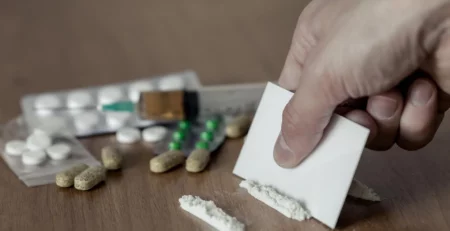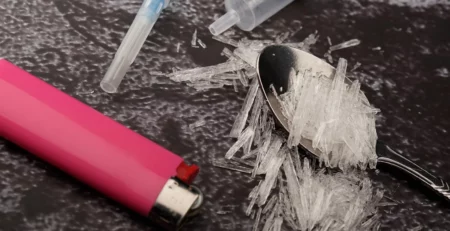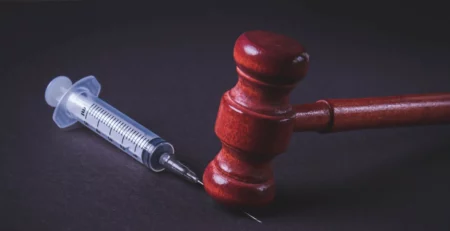Can Meth Cause Depression?
How Methamphetamine Addiction Impacts Mental Health
Methamphetamine addiction may have a hidden symptom that surfaces during meth withdrawal. You may have thought that your low mood was part of your crash and detox, but it could be a very real and separate diagnosis.
The pressing question is this: Can meth cause depression?
The short answer is it depends. Withdrawal symptoms from meth abuse can create mental health symptoms that mirror depression with some common symptoms including anhedonia, sleeping too much or not enough, depressed mood, and even suicidal thoughts. Meth can change the structure of the brain, but it isn’t clear whether depression or drug use occurs first.
Icarus in Nevada can help you with dual diagnosis treatment for meth use and mood issues like depression. We offer same-day admissions for a quicker response. Keep reading to learn how methamphetamine addiction influences your mental health.
Mental Illness and Substance Abuse: How Meth Addiction Influences Depression

According to the Substance Abuse and Mental Health Services Administration, one in four people who have a mental illness will also struggle with a substance use disorder. This means that your drug abuse can exacerbate an existing issue, leading to a more complex need for comprehensive care.
How does methamphetamine use influence depression symptoms as you seek care and go through the withdrawal symptoms?
Get Accredited Treatment Programs at Icarus – Call Now!
Methamphetamine Withdrawal Symptoms: Mood Swings and Depression
Unfortunately, some of the main withdrawal symptoms associated with methamphetamine use are very closely related to a depression diagnosis. If a doctor is unaware that you have been taking meth in any form, it may be likely that they would first diagnose you with a mood disorder.
Honesty can help a doctor make the right diagnosis and offer you the treatment you need for the meth withdrawal. Detox is likely the best option for care at this stage, especially if you exhibit some of these symptoms:
- Fatigue and lack of energy
- Anxiety and irritability
- Sleeping too much or too little
- Low mood in line with clinical depression
- Suicidal thoughts
- Loss of pleasure in things you once enjoyed
- Social withdrawal
While some of these symptoms on their own may not be worrisome, the combination proves to be a real danger to your health, especially if you experience suicidal thoughts. Seek treatment right away if your thoughts drift into this territory. Icarus Nevada offers same-day admissions.
Keep in mind that you may have additional symptoms if you’re taking other substances besides meth. Be open with your providers about drug use so they can truly help.
What are the Effects of Methamphetamine Use on the Brain?

Your drug use may also change the structure of your brain, leading to more severe symptoms. There is a reason that the Drug Enforcement Administration monitors methamphetamine on the streets carefully. It can cause irreversible damage to the corticostriatal terminals in the brain.
What does this mean for someone who struggles with meth abuse or other stimulant addiction?
It means that the way your body processes dopamine is significantly impaired. Dopamine is known as the feel-good chemical in the body. It’s associated with reward and motivation. When the terminals that accept dopamine are impaired by meth use, you may not feel as good or as motivated.
The result is that it mirrors the symptoms of depression. It may be necessary to treat those terminals with additional medication to improve mental health. Proper treatment means that you will need to be monitored to ensure that medications work properly following stimulant use disorder.
How Drug Use and Meth Use Impacts Depression
Other studies point to the likelihood of experiencing depression. The National Institute of Health shows that studies with people who have used methamphetamine at any point in their lives are far more likely to exhibit depression symptoms.
Out of a meta-analysis of fourteen studies with data, those who had repeated meth use in their history were likely to have their lasting recovery colored by the symptoms of depression. However, that doesn’t necessarily mean that meth causes depression.
It could just as easily be the other way around: you may be more likely to have a substance abuse issue if you have depression. There is a lot of research being done to figure out which comes first in some of these cases, but the lines are not yet clearly drawn.
The only answer is that depression and meth can have overlapping negative consequences. The two diagnoses will usually interact and make it that much harder to treat both of them.
Seeking Treatment for Meth Abuse and Depression

Regardless of whether your depression or meth abuse came first, you will likely need some help to get sober and battle the depression. An inpatient facility offers effective treatments while monitoring you for a health crisis related to blood pressure, low mood, and other dangers to your well-being.
Individual counseling and medication management are typically the frontline treatments for both issues. Addiction is possible to treat, as are depression and mood issues. You can experience pleasure again if you get the physical aspect of meth abuse out of your system.
Medication isn’t a silver bullet to better mental health. It still takes trial and error, which is why it can be essential to enroll in a detox program and residential treatment center where you can be monitored and assessments can be made about the dosage and drug of choice.
Up To 100% of Rehab Costs Covered By Insurance – Call Now!
Getting Through Meth Withdrawal at Icarus Nevada
It’s clear that methamphetamine affects the body in serious ways beyond just increased alertness and a feeling of vitality while the drug is in your system. It can also surface as depression and can drum up suicidal thoughts. If you need help right away, Icarus Nevada can help.
We offer same-day admissions for our residential treatment program, where you can have access to around-the-clock care from a team of experienced clinicians and medical professionals. We monitor your symptoms and can administer medications to help in the long term.
Our enrollment team is ready and waiting to answer your questions about the devastating effects of repeated use and long-term methamphetamine use on the brain and body. Let us come alongside you in recovery today!
References
- Mental health and substance use co-occurring disorders. SAMHSA. (n.d.).
- Bamford, N. S., Zhang, H., Joyce, J. A., Scarlis, C. A., Hanan, W., Wu, N. P., André, V. M., Cohen, R., Cepeda, C., Levine, M. S., Harleton, E., & Sulzer, D. (2008). Repeated exposure to methamphetamine causes long-lasting presynaptic corticostriatal depression that is renormalized with drug readministration. Neuron, 58(1), 89–103.
- Leung, J., Mekonen, T., Wang, X., Arunogiri, S., Degenhardt, L., & McKetin, R. (2023). Methamphetamine exposure and depression-A systematic review and meta-analysis. Drug and alcohol review, 42(6), 1438–1449.
- Common Comorbidities with Substance Use Disorders Research Report. Bethesda (MD): National Institutes on Drug Abuse (US); 2020 Apr. Available from:













